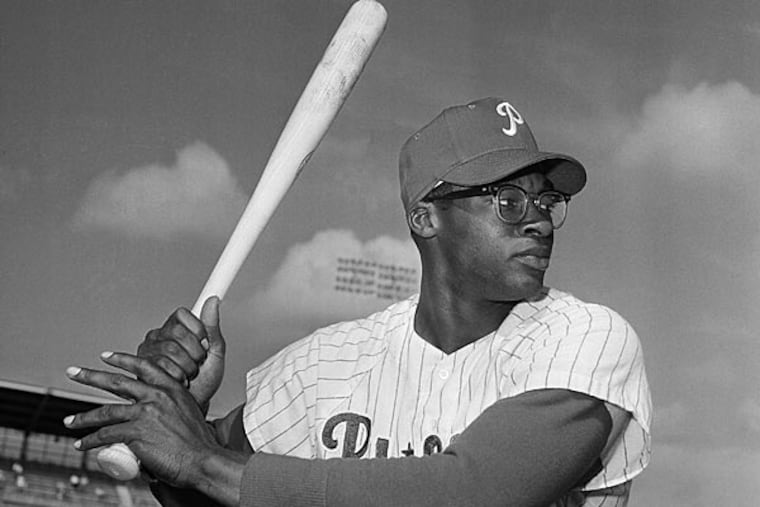Dick Allen comes up one vote short of Hall of Fame
Mark "Frog" Carfagno flew to San Diego on Friday, and he wore a Phillies jersey with ALLEN 15 on the back to the Manchester Grand Hyatt Hotel on Monday. There, he would learn if the crusade to which he'd devoted himself over the last two years had succeeded. There, he would find out whether Dick Allen would be inducted into the National Baseball Hall of Fame.

Mark "Frog" Carfagno flew to San Diego on Friday, and he wore a Phillies jersey with ALLEN 15 on the back to the Manchester Grand Hyatt Hotel on Monday. There, he would learn if the crusade to which he'd devoted himself over the last two years had succeeded. There, he would find out whether Dick Allen would be inducted into the National Baseball Hall of Fame.
There, it turned out, Frog had his heart broken.
The Hall's Golden Era Committee, charged with considering 10 candidates from 1947 through 1972, announced Monday during Major League Baseball's winter meetings that none of the 10 had earned induction next year. Each candidate needed at least 12 votes from the committee's 16 members. Allen received 11. He was one vote short.
"I don't know what to say," Carfagno said over his cellphone. "Would it have been better off if he'd gotten less? Would it be less heartbreaking?"
A former groundskeeper with the Phillies who grew up idolizing Allen and later befriended him, Carfagno had led a campaign to champion Allen's induction - and to do something more. He had begun a movement, really, to rehabilitate Allen's image, to realign his place in the history of the game. The greatness that Allen had manifested over his 15-year career - and make no mistake, for his first 10 years in the majors, Allen was a great hitter, perhaps the best in baseball - had long been obscured by his churlishness with the media and with some of his teammates, by his admitted alcohol consumption before some games, by the perception that he hurt his teams more than he helped them.
"It's almost like every story has to have a bad guy and a good guy, like pro wrestling, and it's like he has to be that bad guy and people just want to leave it like that," said Allen's son Richard Jr., who accompanied Carfagno to San Diego for the announcement. "What bothers me is that when I go to functions and would go to the old-timers' games, and his peers would just go on and on. They respected him. But I get around the public, and I can be in a crowd and hear people say things. I've heard things.
"At one of my son's baseball games, he was running to first. The catcher dropped the ball, and my son didn't see it, so he didn't advance. And I heard, 'Oh, he's lazy, like his grandfather.' That makes me more mad because they don't really know him. It's everything they read."
Even if it wasn't enough to get him into Cooperstown this time, the campaign on behalf of Allen did seem to change those perceptions of him, to cast him in a new light and put his achievements in their proper context. "If anybody had any concern about any press that was associated with Dick," said Phillies president Pat Gillick, a member of the Golden Era Committee, "that was not a concern."
It was high time for this fresher, more accurate and enlightened perspective on Allen. He was the Phillies' first prominent black player, and he played during an era, in this city particularly, of severe racial tumult. As a boy, Carfagno took the No. 33 bus to get to Connie Mack Stadium - located at 21st and Lehigh in North Philadelphia - into an area that had been the site of a series of riots in 1964. Often, he said, as the bus passed Girard College, the driver would yell, "Hit the deck!" as protesters pelted the vehicle with rocks and debris.
"It was terrible," he said. "You had a bunch of white people on the bus. You get inside the stadium, and who's the first guy they want to get on?"
Yet from 1964 - the year he started for the Phillies at third base and was named the National League's rookie of the year - through 1974, Allen compiled a 165 OPS-plus, his on-base-plus-slugging percentage adjusted for minor variables, including the ballparks in which he played. There is no better measure of a hitter's productivity and power, and over that decade, Allen's OPS-plus was the best in Major League Baseball, including those of the 17 Hall of Famers who were his contemporaries.
That accomplishment alone makes Allen deserving of induction, and his chances for enshrinement are better now, actually. This was the first time he had been a finalist on the ballot, and because of Carfagno's work, when Allen is eligible again three years from now, there will be less lobbying, less work, to be done. The foundation for his candidacy has already been established. Mark Carfagno flew 3,000 miles Friday only to have his heart broken Monday, to have Dick Allen finish one vote away from immortality, but the truest measure of what he did for his friend is that he had good reason to board that plane at all.
@MikeSielski